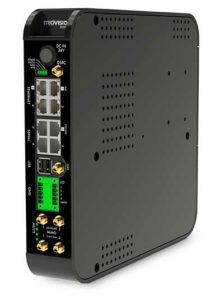Summary
To develop its TrafficLink hardware for collecting and transmitting video and other key data at busy intersections, Miovision turned to Opengear to ensure resilient connectivity no matter the conditions. The result has enabled forward-looking cities to solve congestion issues through smarter, data-driven traffic management strategies.
The Challenge
Since 2003, Myriad has guided enterprises through the process of defining, designing, and executing business-critical technology improvements, offering a range of networking equipment, expert consulting, and global logistics services that meet businesses’ evolving needs for network infrastructure deployment, reliability, and optimization. With Myriad, customers can utilize any heterogenous collection of network equipment that meets their unique use case. Myriad will take receipt of the equipment, perform pre-configuration, validate it and burn it in, and then ship the equipment rack to a client’s branch office or remote site. The business then only needs to plug in the equipment for that network infrastructure to be online and fully operational. To meet the challenge of handling client requests that demand a higher volume and complexity of network device needs, Myriad realized it required a solution capable of automating and significantly expediting equipment configurations (while still supporting Myriad’s vendor-agnostic mandate).
In addition to the automation challenge, Myriad serves many organizations – including service providers, hosting companies, financial services firms, higher education facilities, healthcare providers, retailers and more – with network infrastructure spanning multiple remote locations. Those dispersed facilities often do not have dedicated IT personnel on-site; instead, administrators at a centralized location need the ability to remotely access and troubleshoot equipment at those sites. If connectivity at those sites goes down and they become inaccessible by remote methods, personnel must physically travel to the site to troubleshoot issues and bring equipment back online. This circumstance often means paying for an expensive, long-distance flight, taking a technician away from his or her normal duties, and prolonged downtime that negatively impacts a business’ operations and reputation. As a provider of security, access, and management solutions, Myriad sought out an out-of-band solution that could provide reliable 4G-LTE cellular-based backup connectivity, and meaningfully transform how clients are able to manage sites and maintain uptime to keep their customers and employees satisfied.
The Solution
 After investigating the prospect of developing what it needed in-house, Miovision determined that the time-to-market for its TrafficLink platform would be much more rapid if the company instead formed the right partnership. Miovision thoroughly explored the marketplace and found Opengear had the requisite network connectivity resilience, cellular capabilities, and experience alleviating unpredictable environmental issues that Miovision needed in a long-term technology partner. Beyond this, Opengear distinguished itself as a strong fit from a relationship standpoint, as the similarly-sized companies showed a willingness to work and grow with one another.
After investigating the prospect of developing what it needed in-house, Miovision determined that the time-to-market for its TrafficLink platform would be much more rapid if the company instead formed the right partnership. Miovision thoroughly explored the marketplace and found Opengear had the requisite network connectivity resilience, cellular capabilities, and experience alleviating unpredictable environmental issues that Miovision needed in a long-term technology partner. Beyond this, Opengear distinguished itself as a strong fit from a relationship standpoint, as the similarly-sized companies showed a willingness to work and grow with one another.
Miovision TrafficLink hardware is based on an existing Opengear Resilience Gateway model, fit to purpose for Miovision’s unique needs. The biggest perceived hurdle was ensuring the complete reliability of the hardware components in traffic cabinet environments, where the temperatures can range between -29ºF (-34º C) and 165ºF (74ºC) – a challenging technical feat that the teams nevertheless achieved.
“Opengear’s reliable out-of-band management capabilities were a crucial factor that affected the speed and success of the TrafficLink rollout,” said Matt Ignor, Director of Hardware Development at Miovision. “Developing our solution to withstand extreme weather conditions and meet strict specifications certainly posed a challenge, but Opengear delivered the technology and expertise we needed to get it done right.”
The Results
Backed by Opengear’s technology and hardware development support, the Miovision TrafficLink solution now enables cities to utilize reliable data streams to solve traffic problems. Furthermore, cities can use Miovision’s hardware alongside existing equipment to communicate with their traffic cabinets via secure LTE cellular connections, making it simple to manage data communications, security, servers, and IT integrations. For municipalities, this puts in place an open and extensible solution that lays the groundwork for further smart city development down the road.
“Visits to cabinets at traffic intersections for required maintenance are very, very rare thanks to the dependability of Opengear’s technology and the powerful backend capabilities built-in to address needs remotely,” said Ignor.
Miovision’s traffic solutions continue to deliver measurable – and impressive – results. Ingebaires SLU, a civil engineering consulting company based in Spain, has reduced traffic study costs by nearly 70% with Miovision. Chicago is making extensive use of Miovision in its initiative to become the most bike-friendly city in the United States. Similarly, the Massachusetts Department of Transportation was able to reduce instances where a line of traffic fails to clear an intersection during a single green light by almost 50%, greatly improving traffic flow thanks to technology from Miovision. In total, more than 17,000 cities have now implemented Miovision technology, helping them succeed in reducing drive times and pollution, among other benefits.
Smart City Infrastructure
The company started by three University of Waterloo friends in a basement has evolved into the leading authority on traffic data. Miovision began as a traffic solution company, but our continued approach to innovation and dedication to solving real-world problems has led us to where we stand today: helping cities achieve their smart city visions.